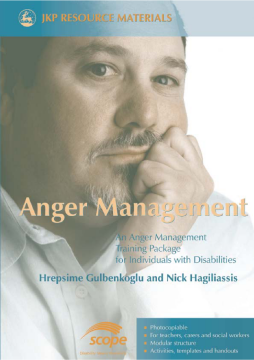
Additional Information
Book Details
Abstract
Many people with intellectual disabilities have difficulty managing feelings of anger. Anger Management is a complete training package for helping people with intellectual or physical disabilities deal with anger in constructive, effective ways.
The training programme consists of 12 fully-scripted sessions dealing with topics such as recognising feelings of anger, learning to relax and think calmly, and being assertive and handling problems competently. Each session follows a standard format, including introductions, reviews of previous sessions, and explanations. Photocopiable handouts, facilitator's script and evaluation sheets are provided for each session.
Designed specifically for people with intellectual disabilities, but suitable for people with physical disabilities too, this training package provides relevant and authoritative information and exercises.
It is a tried-and-tested resource which will provide effective strategies for anger management trainers, psychologists and counsellors.
This is an easy-to-read, structured, 12 session programme package. The session flowed well, following the constructs of cognitive-behavioural techniques, with a heavy emphasis on pictographs to aid understanding.
The Psychologist
Gulbenkoglu and Hagiliassis make a strong case for the need for anger management programs among disabled individuals with intellectual or communication disabilities, and they have also compiled a training package that may have clinical utility. Gulbenkoglu and Hagiliassis's text provides a perfect starting point for further research.
PsycCRITIQUES
The packaging covers such topics as feelings and anger, helpful and unhelpful ways of dealing with anger, learning to relax, thinking calmly, handling problems, speaking up for ourselves, and "putting it all together" in behavioural terms.
Book News
Hrepsime Gulbenkoglu is a psychologist with 22 years' experience in the physical and multiple disabilities area. She has a B.A and postgraduate qualification in Psychology from the University of Istanbul, Turkey. She as worked with children and adults with disabilities and their families in Australia and overseas providing psychological assessment, behavioural intervention and counselling services. She works as a senior clinician with the Statewide Specialist Services team with Scope (Vic.) Ltd. providing external consultancies, direct services and training. Nick Hagiliassis is a psychologist with eight years' experience in the disability field. He completed a BSc and an MPsych at Monash University, Melbourne, Australia, and currently works as the Discipline Specific Advisor (Psychology) with the Statewide Specialist Services team with Scope (Vic.) Ltd., and also provides direct services to children and adults with disabilities and their families. Nick's clinical and research interests are in the areas of psychological assessment and learning disabilities.
Scope (Vic.) Ltd is a non-profit organisation providing disability services throughout Melbourne and Victoria, Australia, to over thousands of children and adults with physical and multiple disabilities. Many more people make use of Scope's information, support and assessment services.
In terms of supporting people with acquired brain injuries the structured learning regime would for most people work well. Additionally the clearly scripted self management resources may well prove useful in delivering clear and precise coping strategies.
The Encephalitis Society
Table of Contents
| Section Title | Page | Action | Price |
|---|---|---|---|
| Prelims (Contents, List of Figures, List of Tables, List of Boxes, Preface, Acknowledgements, Introduction) | |||
| 1. Urban sanitation – problems and responses | |||
| 2. A strategic framework for urban sanitation planning | |||
| 3. Strategic sanitation planning in towns and cities | |||
| 4. Developing a supportive context | |||
| 5. Developing a strategic process from the local level | |||
| 6. The role of sanitation and hygiene sanitation promotion in developing and informing demand | |||
| 7. Gathering and using information for strategic planning | |||
| 8. Choosing an appropriate sanitation technology | |||
| 9. Guidelines for holding a participatory workshop | |||
| 10. Implementing the plan | |||
| Back Matter (Appendices 1 - 4, Glossary, References, Index) |
